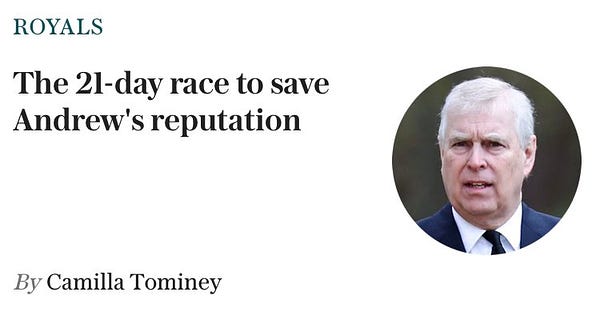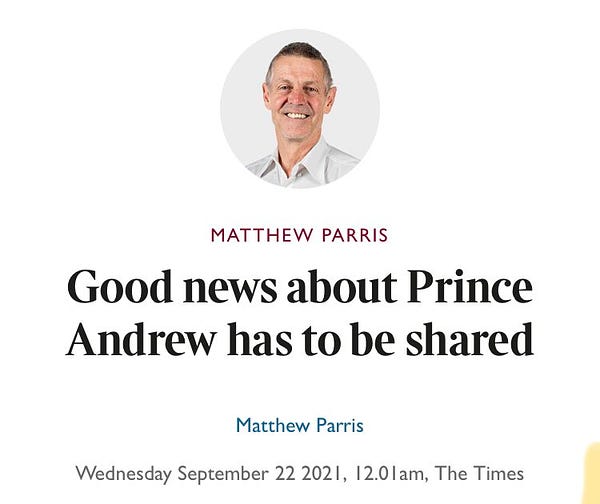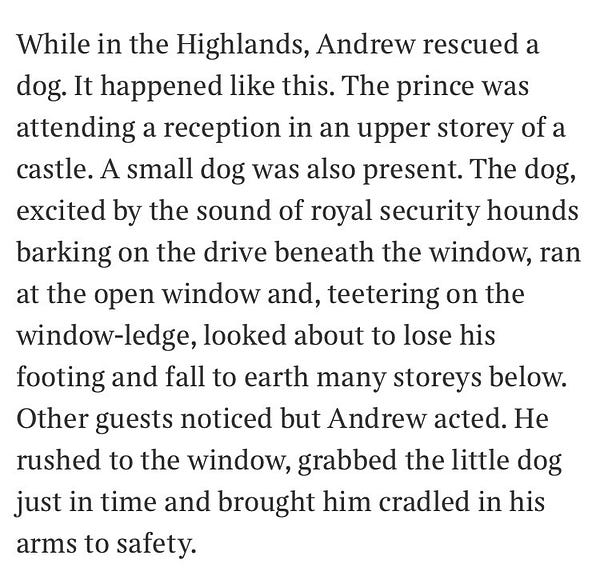The Moran’s Promise: After The Times tells students it’ll teach them who the bastards are, it shares a rumour that Prince Andrew saved a dog…
Some of the worst “terrible stupid bastards” have bylines.
One of the things that frequently comes up in the boardrooms of British publishers is the question of how to get young people to read newspapers.
Suggestions that executives might hire a more diverse set of columnists, encourage the ones they currently have to stop claiming that ‘the woke’ are ruining everything, and ditch the addiction to writing “millennials/Gen-Z are destroying [insert noun here]” articles don’t appeal. Instead, we’re stuck with angry demands that young people “pick up a paper” and increasingly cringe-worthy advertising extolling the virtues of those papers.
Yesterday’s Times carried a house ad1 in the comment section; it squatted just underneath William Hague’s column, with the latest contribution from Spiked columnist Joanna Williams (‘How Stonewall became the new establishment") just over the page, and purported to be targeted at students but was clearly written in the hope that their parents would decide they needed to take The Times with them to university.

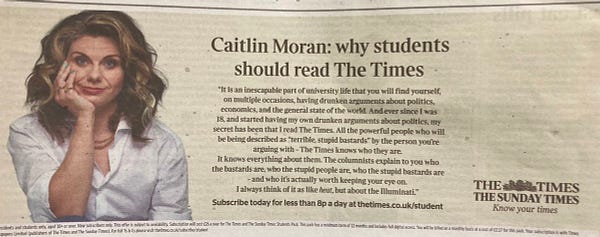
The headline reads Caitlin Moran: why students should read The Times, which is an interesting angle when being home-schooled and getting a column in The Times aged 18 is a central plank in the Moran mythos. And in May 2021, she wrote a column with the headline (“Do I regret not going to university? Hell, no”) and the lede (“My daughters aren’t going either. It’s not worth it.”)
What that column didn’t note was that Moran’s daughters have a slight leg up as their mother and father — the music writer Pete Paphides, The Times’ former chief rock critic and a successful author like Moran — are well-connected across the worlds of media, music and the wider arts.
That might have a little to do with why Lauren Laverne, a friend of Moran and Paphides, played the first single by one of those daughters, Eaves Wilder, on her 6Music show without mentioning she was promoting the work of the daughter of a close friend.
It’s easy for Moran to talk about university as “not worth it”, despite having no personal experience of it, because her particular combination of luck and talent worked out. And while she often dips back into her childhood for credibility, her own children have the advantage of another kind of luck — parental wealth and prestige — that means they don’t need the boost of university.
But despite her documented distaste for university (“I think your spell at jolly old varsity was basically three wasted years of smoking substandard marijuana and delaying the onset of adulthood…”), Moran writes in the ad targeting students who are going that:
It is an inescapable part of university life that you will find yourself, on multiple occasions, having drunken arguments about politics, economics, and the general state of the world.
And ever since I was 18, and started having my own drunken arguments about politics, my secret has been that I read The Times.
Only, 18-year-old Caitlin was a Times columnist when she started having those “drunken arguments about politics” having joined Melody Maker at 16. By 19, she was the subject of a patronising Hunter Davies profile in The Independent (he calls her “petal”2 at one point), boasting that…
I don't regret not going to college. Students learn up to the age of 21, then stop. I'll always be learning - the things that really matter in life. How to sign on, how to get free food, how to be streetwise. At my age now, I suppose I'd be first-year college, in the ordinary way of things, getting marks out of 10 for my thousand-word essay. Instead, I get pounds 500 for every thousand-word newspaper essay. Which would you choose?'
… and saying later in the article:
I'm seeing the editor of a Sunday newspaper this afternoon. I know she'll offer me mega-bucks to do an opinion column, but I don't want that. I don't like opinion journalism. Anyway, how can you have 52 opinions a year?
Reader, she found a way.

In that same Hunter Davies profile, Moran offered her version of how she came to have The Times column that she still occupies. She explained:
I was doing this column for The Observer at one time, and one week they didn’t use it. It was really brilliant, all about how awful London is… after four weeks of it not being used, I thought, ‘Hell, I’ll ring The Times, see if they’ll take my stuff instead.’ And they did.
So there’s how Moran came to read and write for The Times: Pure commercial imperative. But the ad text continues:
All the powerful people who will be being described as “terrible stupid bastards” by the person you’re arguing with — The Times knows who they are.
It knows everything about them. The columnists explain to you who the bastards are, who the stupid people are, who the stupid people are, who the stupid bastards are — and who it’s actually worth keeping your eye on.
I always think of it as like heat, but about the Illuminati.
The lie here is that The Times observes the actions of the powerful bastards with a gimlet eye, at one remove from their concerns, rather than being owned by one of the world’s most prevailing powerful bastards, serving as the voice of the establishment’s many terrible stupid bastards, and offering bylines to a fair proportion of them.

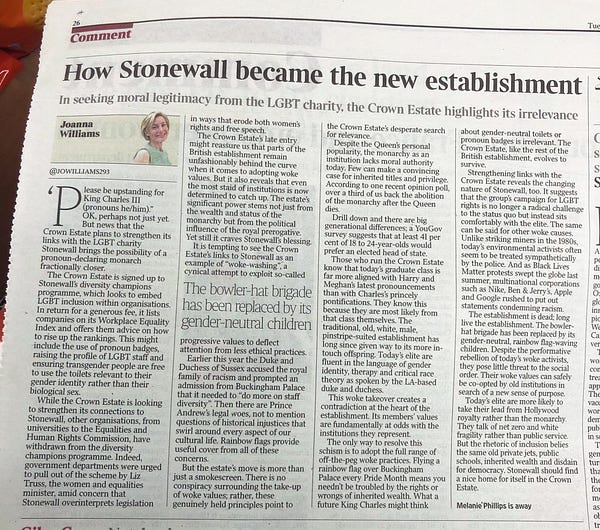
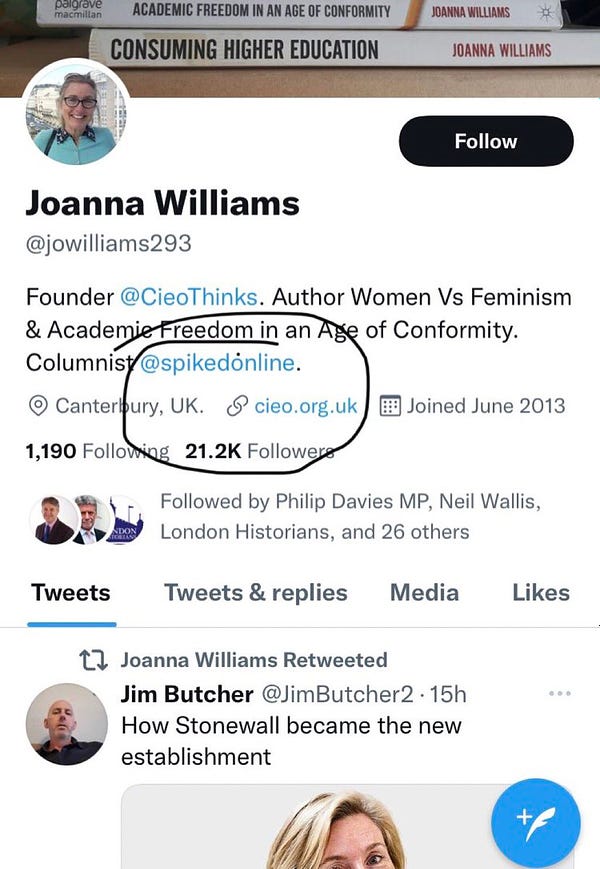
Yesterday’s Times Comment section was written by a former Tory leader and foreign secretary (William Hague), a think-tank founder and columnist for Spiked (Joanna Williams, sitting in for the Melanie Phillips), a hereditary journalist who has yet to apologise for gloating about the death of a young woman (Giles Coren), the CEO of a multi-national investment firm (Blackstone’s Stephen Schwarzman), and the son of a former Tory foreign secretary (Hugo Rifkind).
In a way, the ad is quite honest. Times columnists do often explain who they think the “bastards” are, it’s just that often seems to be trans people, GRT communities, the poor (who should just try a bit harder), the metropolitan elite (you know, the ones who don’t come to their dinner parties), and an all-purpose blob called “the woke” who it seems are behind everything bad.
The Times exists to make excuses for the real terrible bastards and to explain why actually it’s people who want to change anything that are the real problem.
As I’ve written many times before, it is the paper for people who require more syllables than Sun readers but are happy to swallow the same reactionary talking points. There’s a reason that Rod Liddle and Jeremy Clarkson can do double duty as columnists for The Sunday Times and The Sun. It’s like the Duff Beer factory where the vats for Duff, Duff Lite and Duff Dry are all served by the same pipe; The Sun and The Times — different labels, same sour taste.
Moran was just making a jokey aside when she referenced the Illuminati, but if she weren’t a Times columnist hawking the paper as a product you can be sure the paper would take the reference not as a joke but bad faith ‘proof’ that she was a conspiracy theorist.
The fact that The Times is the property of one of the four families that control 75% of the UK’s newspaper circulation (the Murdochs, the Rothermeres, the Barclays, and the Lebedevs) is totally fine though because you can trust Mr Murdoch to tell you who the bastards are. It’s definitely not him and you’re just a jealous cynic if you say otherwise.
As for the very “How Do You Do, Fellow Kids?” reference to heat magazine, I’m more inclined to see The Times as like Michael Mann’s Heat, where crooks and ‘cops’ battle it out with the rest of us as collateral damage. While it is true that The Times treats politics like gossip in the same way heat covers its more attractive subjects, it is far more influential and far more damaging. Nobody takes heat seriously while The Times still trades on the idea that it is the “paper of record”, despite being scratched and warped beyond repair.
And on the subject of “terrible stupid bastards”…
In today’s Daily Telegraph, Camilla Tominey has a piece headlined The 21-day race to save Prince Andrew's reputation. It absolutely stinks of palace briefings and contorts itself so much to put octopus Andy’s side of the story that it looks like a pretzel by the time the copy is done.
Tominey describes Prince Andrew as “a doting family man” — odd framing after this week’s stories that he did not go to meet his daughter’s new baby because he was too busy hiding at Balmoral — and, quoting a “very well placed source”, describes his strategy as “turning a crisis into an opportunity”.
Unsurprisingly, given that Tominey’s byline was on the December 2020 story whose headline screamed Andrew accuser was “on the game for a year”, her article today is heavily slanted against Virginia Roberts Giuffre. It quotes a ‘friend’ of the Prince (“This is Mrs Giuffre’s case. She has brought it, therefore she has actively invited legal scrutiny of her own version of events.”) and includes this paragraph of almost super-human reaching, insinuation and threat:
Citing inconsistencies in her story – including claiming the teetotal Duke drank a cocktail, and alleging there were four encounters, when her writ only details three – they added: “The modus operandi of the US lawyers will be to robustly engage and challenge. For Giuffre, it could prove to be a case of be careful what you wish for.”
Oh well, I suppose if the man who claimed, in defiance of medical science and sense, that he cannot sweat says he doesn’t drink I guess we’ll have to believe him. I mean, a man who was Woking Pizza Express’ Customer of the Year 2001 and the top Yelp! reviewer for Jeffrey Epstein’s homes, planes and islands is hardly going to lie, is he?
I bring up Tominey’s article not to dive too deeply into The Telegraph’s ongoing supine public relations campaign on behalf of the royals — I’ve covered that extensively before and will do again soon — but as a way of introducing today’s best example of The Times’ coverage of “terrible stupid bastards”.

Matthew Parris’ notebook column today comes with the headline Good news about Prince Andrew has to be shared. To which the only rational response is: “Does it?” and “Why?” Parris begins:
Prince Andrew has had very little positive publicity in recent months so I thought I’d contribute a snippet. I picked this up in Scotland over the weekend and my source, who shall be nameless, is impeccable — indeed was present.
Yeah, people accused of child sexual abuse do tend to garner “very little positive publicity” even if they’re the Queen’s favourite child and especially if they continue to refuse to cooperate with investigations and have it leaked to the press that they intend to return to public ‘duties’ soon.


Still, good that we have Matthew to offer us a whispered anecdote of the Prince’s kindness and bravery. Of course, we have to take the word of Parris — who not long ago wrote a column arguing that GRT people should be stripped of ethnic minority status and followed it up a few weeks later with a mealy-mouthed piece about listening to their ‘concerns’ but his view remaining unchanged — on the moral standing of his shallow throat source. He continues:
While in the Highlands, Andrew rescued a dog. It happened like this. The prince was attending a reception in an upper storey of a castle. A small dog was also present. The dog, excited by the sound of royal security hounds barking on the drive beneath the window, ran at the open window and, teetering on the window-ledge, looked about to lose his footing and fall to earth many storeys below. Other guests noticed but Andrew acted. He rushed to the window, grabbed the little dog just in time and brought him cradled in his arms to safety.
OK, it wasn’t a fair maiden and there were no dragons but it’s a heart-warming tale of sympathy and quick-thinking — and, for Prince Andrew, every little helps.
It’s another example of the contempt that some Times columnists and their editors have for readers. As I wrote yesterday about the Elvis/Lennon/Nixon tale balanced on a single source, it’s not journalism, it’s stenography. Parris attempt at aiding Prince Andrew is even worse because in the case of the Elvis story we knew who had made the claims — ‘Whispering’ Bob Harris — and could make an assessment of their validity.
Parris is allowed to use his column to assure us that Prince Andrew saved a dog, that he “acted” while others simply looked on. And, as we know from the insanity that surrounded the euthanasia of Keir Starmer’s one true nemesis Geronimo the Alpaca as well the evacuation of dogs and cats from Afghanistan ahead of their human custodians, British public discourse is addled when it comes to animals.
“How can Andy be all bad if he likes dogs? And after all we like dogs better than we do Americans…”
Reading Parris column made me realise that Moran’s line about The Times being “like heat but for the Illuminati” is true, but not in the way she meant it. She and The Times’ subscription department want students to think that the paper gives its readers the inside track on what the powerful are doing. What they actually get most of the time — a few big investigations aside — is the story of the world as those powerful people want to present it.
So while anyone paying attention can see that Prince Andrew has slithered and slimed his way from accountability — sweating as he goes — The Times gives Parris the space to push a single-sourced tale of princely bravery. “For Prince Andrew, every little helps,” writes Parris and The Times is helping where it can, not calling out the bastards but humanising them however it can.
House ad (n.): One placed by the publication itself, often to fill space when it isn’t wanted by an external advertiser, but sometimes simply there because the paper/magazine specifically wants to advertise.
“Any other ambitions achieved, petal?“






